The best mesh Wi-Fi systems in 2025: our favorite systems for home and business use
Need better Wi-Fi coverage? These are the best mesh Wi-Fi systems you can buy
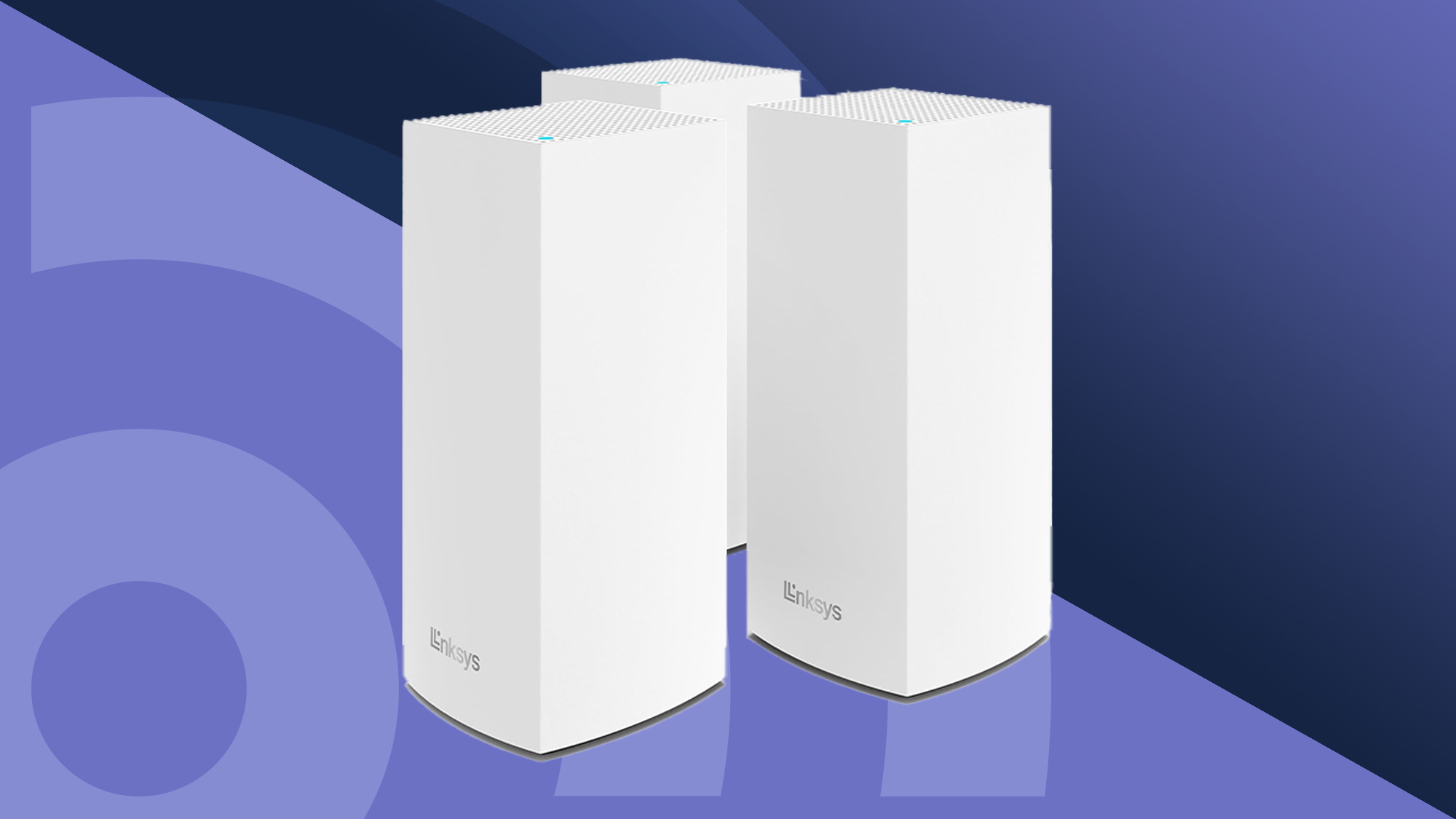
The best mesh Wi-Fi systems are perfect for larger homes - or anywhere where a single Wi-Fi router struggles to cover.
Rather than having a single router try to spread its wireless network across your property, mesh Wi-Fi systems are made up of several units that you can place around your home, giving you a single wireless network that can cover even the largest of properties.
Many mesh Wi-Fi systems come in various packs, with additional satellites included for larger properties.
This means it should be easier to find a mesh Wi-Fi system that suits both your home and your budget. However, make no mistake: because of the tech involved, mesh Wi-Fi systems can be very expensive.
The good news is that there are more affordable options, alongside cutting-edge devices, and in this guide, we cover a range of price options.

I've been leading TechRadar's computing coverage for over 10 years, and have been writing about (and reviewing) routers and networking devices for almost two decades now. Living in a multi-story townhouse, I've been looking for ways to get my home network into every room without having to trail network cables everywhere, and mesh Wi-Fi systems are perfect for this. Using my knowlege and experience with various Wi-Fi products, I've put together this updated list to help you find the ideal mesh Wi-Fi system for your needs and budget.
This buying guide has had a major update as of 10/27/2025 with the very latest mesh Wi-Fi systems.
The best mesh Wi-Fi system overall
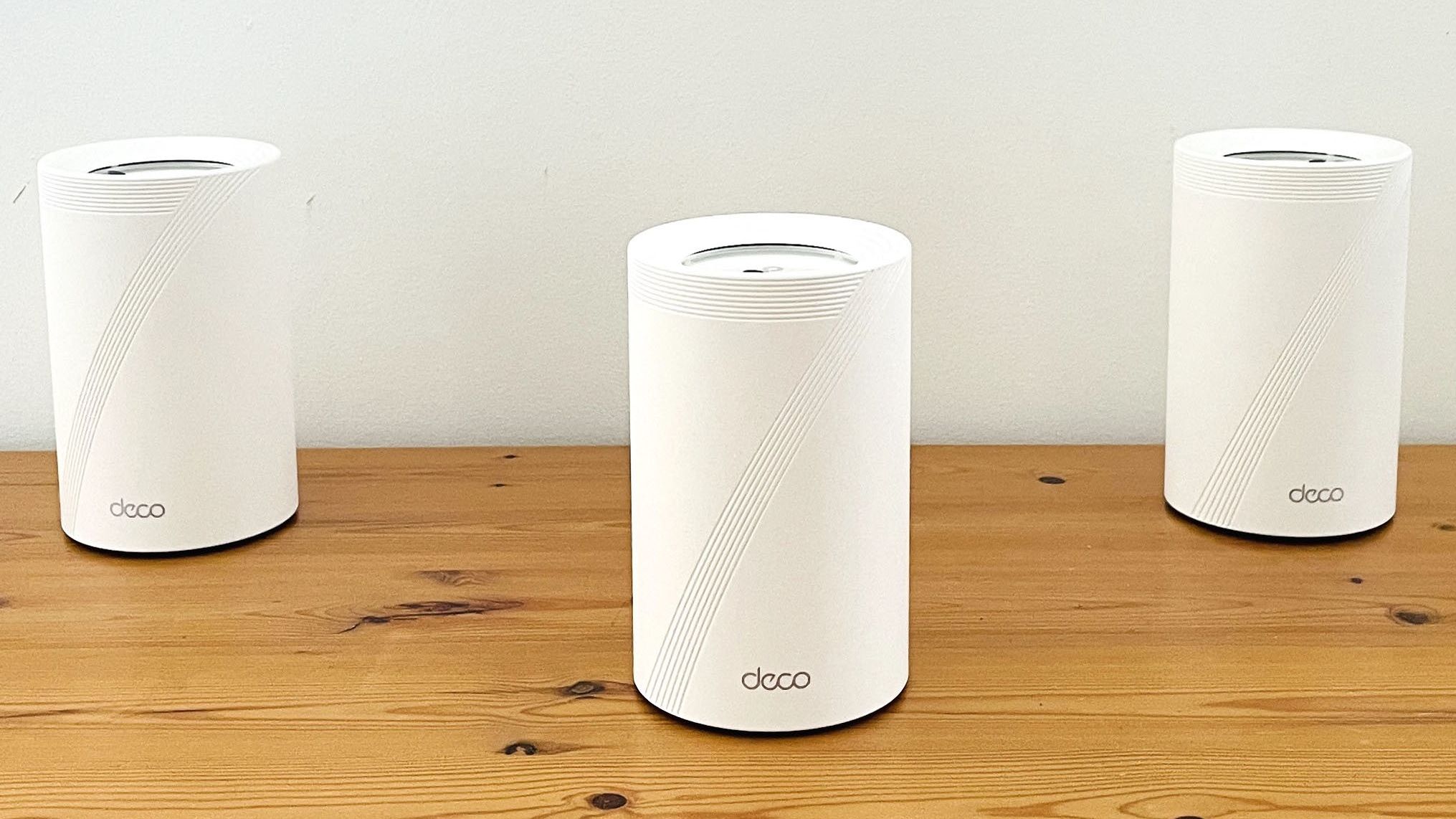
Specifications
Reasons to buy
Reasons to avoid
The TP-Link Deco BE63 is our latest pick as the best mesh Wi-Fi system you can buy in 2025. It features cutting-edge Wi-Fi 7 support for fast speeds and wide and dependable wireless signal, yet it also comes with a decent price. Sure, this is still an expensive investment, as all mesh systems with multiple units are, but for the quality you get here, the price is very reasonable.
During our review of the TP-Link Deco BE63 we were particularly impressed with the performance of the system, giving our test network an instant speed boost that meant the speed of our test broadband connection was fully utilized. Even better, as we moved around the building, we still got the maximum network speed thanks to the mesh Wi-Fi network the TP-Link Deco BE63 created - even in parts of the building where traditional Wi-Fi struggled to reach.
It also comes with some great features, including free parental controls, which makes this an excellent Wi-Fi mesh system for large family homes, as it means everyone in the house can connect easily, while also making sure that younger family members are kept safe.
Setting up the system is incredibly easy as well, as the three Deco units we tested all connected to each other automatically, and all we needed to do to setup the Wi-Fi network was enter in a network name and password.
While we tested the three-unit version (which is sometimes called the Deco BE65 in the UK and Australia), you can also buy two-unit packs for smaller homes and offices, and a single unit as well, which can either be used as a traditional router, or added to an existing mesh network to expand the range. For most people, the three-unit pack will be more than enough.
Read our full TP-Link Deco BE63 review
The best budget mesh Wi-Fi system
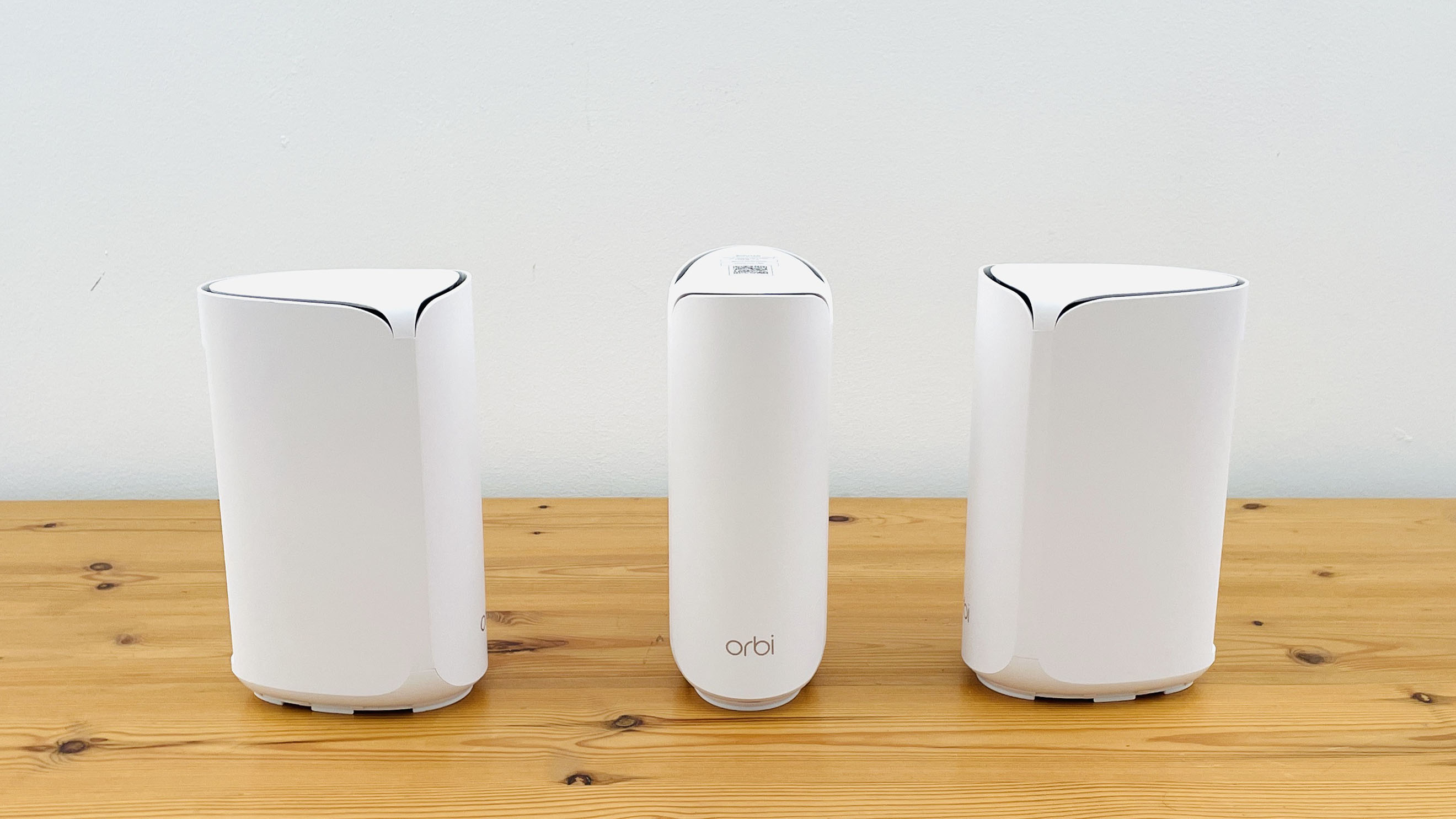
Specifications
Reasons to buy
Reasons to avoid
Netgear's Orbi range of mesh Wi-Fi systems used to be some of the most expensive on the market, so it's great to see the company is now also making some brilliant budget mesh systems as well.
The Netgear Orbi 370 series is the company's latest budget release, offering the design and ease of use that we've come to expect from Orbi devices, but for a very competitive price.
Despite its budget price, this is a Wi-Fi 7 router, so you get access to the very latest wireless networking technology. However, to keep the price down, this is just dual-band Wi-Fi 7, so you get the 2.4GHz and 5.0GHz frequency bands, but not the faster 6.0GHz band that is available with both Wi-Fi 6E and Wi-Fi 7.
This might seem like a big sacrifice, but Wi-Fi 7's upgrades aren't just about raw speed, but improving the reach and reliability of your home network, so while you might not be getting the absolute fastest speeds, you will still benefit from upgrading.
We reviewed the Orbi 373 pack, which features three units for the largest of houses, and we found it to be incredibly easy to set up and use, with the automatic setup procedure doing pretty much all of the hard work for us.
During our review we saw the Netgear Orbi 373 boost our network speeds to make use of our broadband connection (despite only being dual-band, the Netgear Orbi 373 will offer more than enough speed for household broadband connections). You can also set up parental controls, though you have to pay a subscription for the Orbi's built-in service.
Read our full Netgear Orbi 373 review
The best mesh Wi-Fi system with 6E
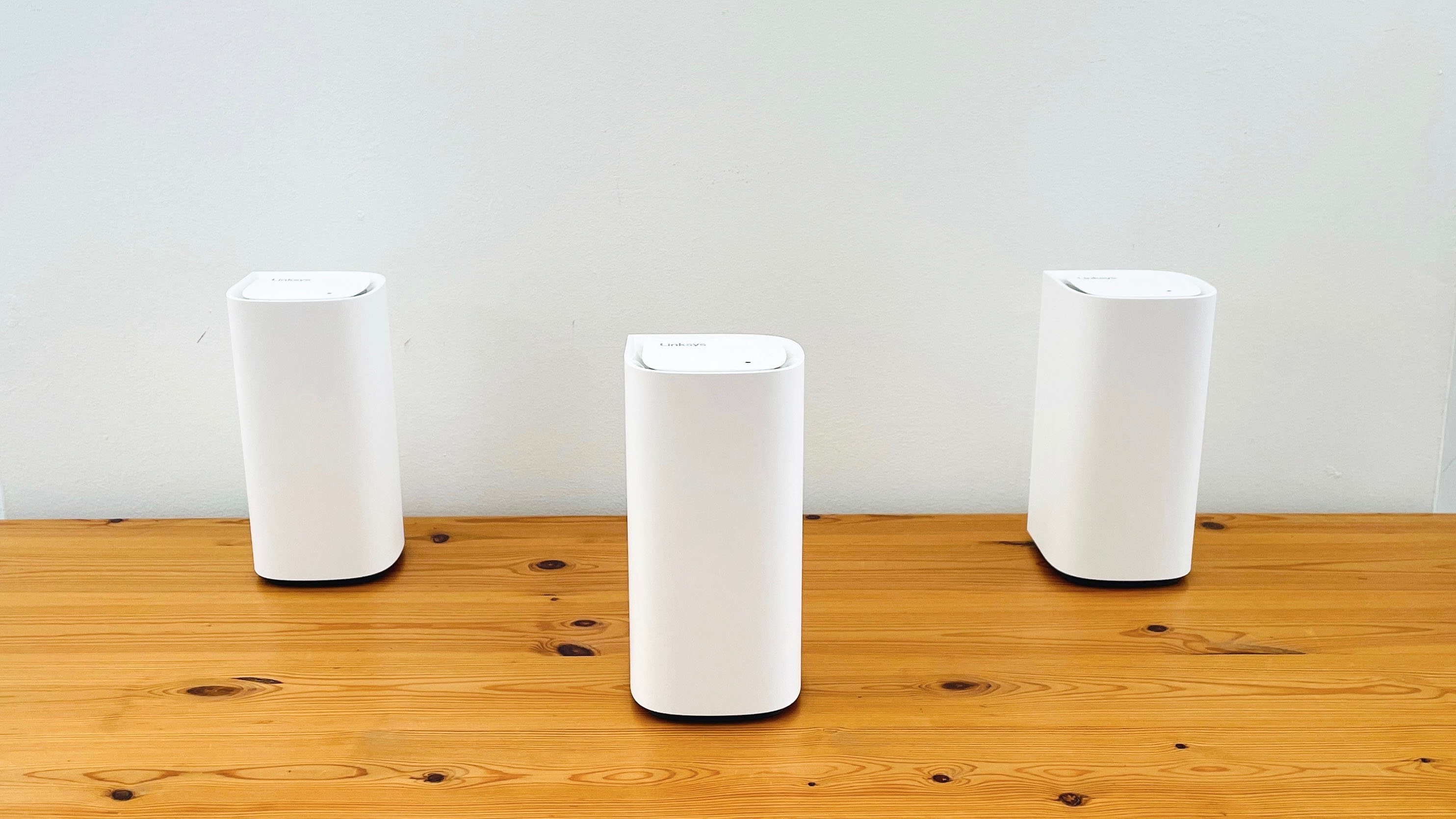
Specifications
Reasons to buy
Reasons to avoid
If you’re looking to upgrade your mesh router, chances are you care about one thing above all others: performance. Here, the Linksys Velop Pro 6E is an excellent option. In our testing, it provided consistent 150Mbps download speeds, even when we placed it 30 feet away and behind three partition walls. In fact, it’s capable of hitting speeds of up to 5.4Gbps, making it a seriously speedy router for your home setup. It can easily cover your entire house or office if required, making it ideal for when you really need that stable connection.
It's something of a “no frills” mesh system, and it lacks some of the high-end features provided by some of its rivals. Yet it’s not totally devoid of additional utility.
Each Velop router can handle up to 200 connected devices, for example, making it perfect for homes with hordes of internet-enabled devices. It’s also competitively priced among other mesh routers, so if all you need is rock-solid performance, it’s an attractive option.
Read our full Linksys Velop Pro 6E review
The best mesh Wi-Fi system for gaming
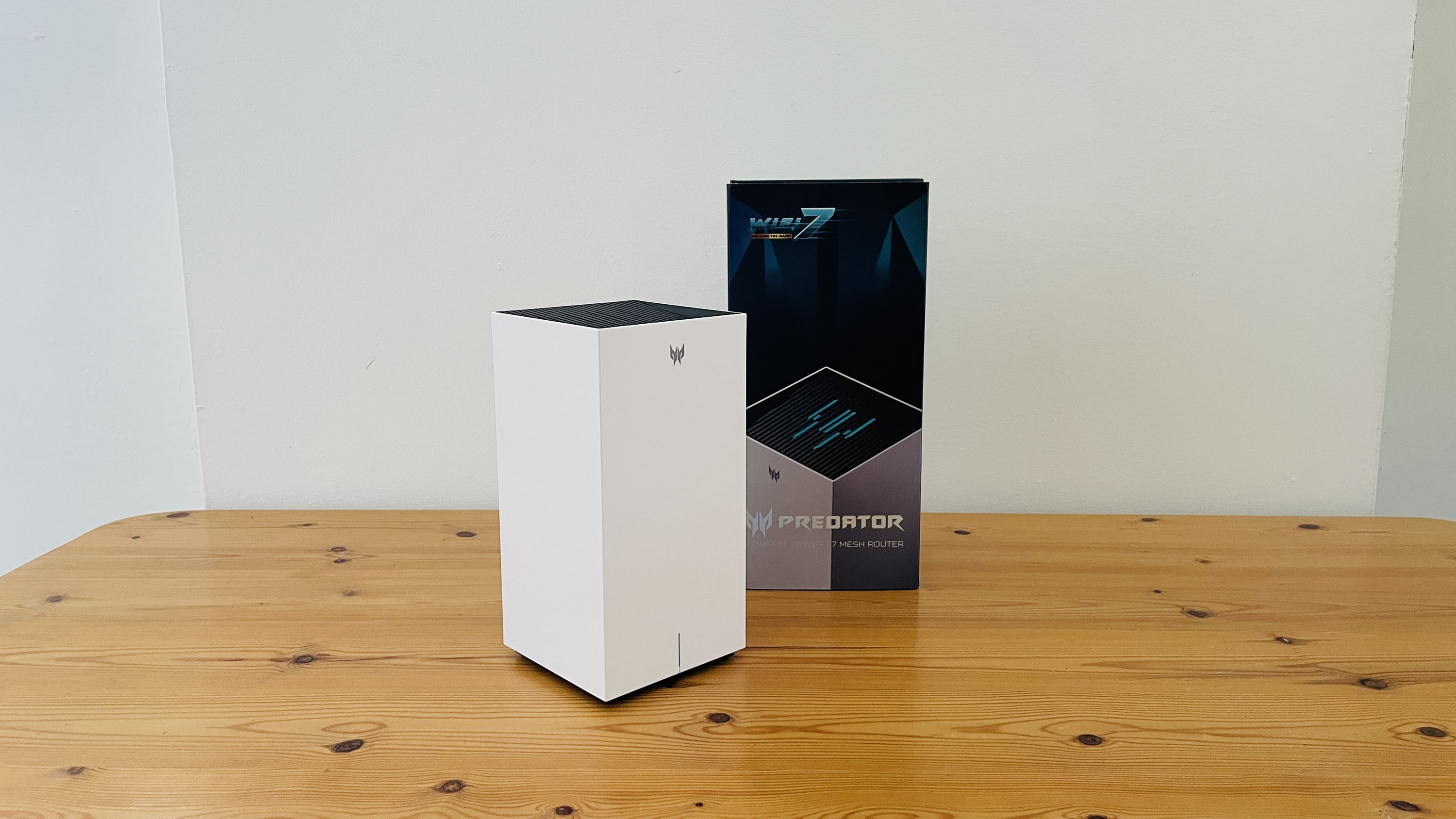
Specifications
Reasons to buy
Reasons to avoid
The Acer Predator Connect T7 is the best mesh router system for gamers. As you'd expect from a product in Acer's gaming-foccussed Predator series, the Connect T7 features cutting-edge technology to give gamers the very best experience and performance.
If you play a lot of competitive games online, even the slightest hint of latency or lag can make the difference between winning and losing, and Acer claims the Predator Connect T7 can offer ‘wired-level latency.’ This is a big claim, as many gamers prefer to stick with wired connections via a LAN cable to eliminate any potential delay to the actions they perform on their PC or console, and it registering with the online game's server. By cutting the latency as much as possible for wireless connections, this gives gamers a lot more flexibility, as they don't need to trail network cables everywhere.
Of course, if gamers want to stick with a wired connection, each T7 unit comes with two Gigabit Ethernet ports.
Other game-centric features include a QoS option – quality of service – that allows you to prioritise high-bandwidth tasks such as gaming or streaming video for specific devices, plus security and parental control features.
In our tests, we found that the Acer Predator Connect T7 delivered on its lofty promises, with fast and dependable Wi-Fi speeds across the entire building. The T7's top speed of 11Gbps is incredibly fast, and will be overkill for most people. However, if you have lots of devices on the network for playing local multiplayer games, then this is a fantastic investment. If you're not a hardcore gamer, however, you may be better off with a different mesh Wi-Fi system in this list.
Read our full Acer Predator Connect T7 Wi-Fi 7 Mesh Router review
The best mesh Wi-Fi system for homes
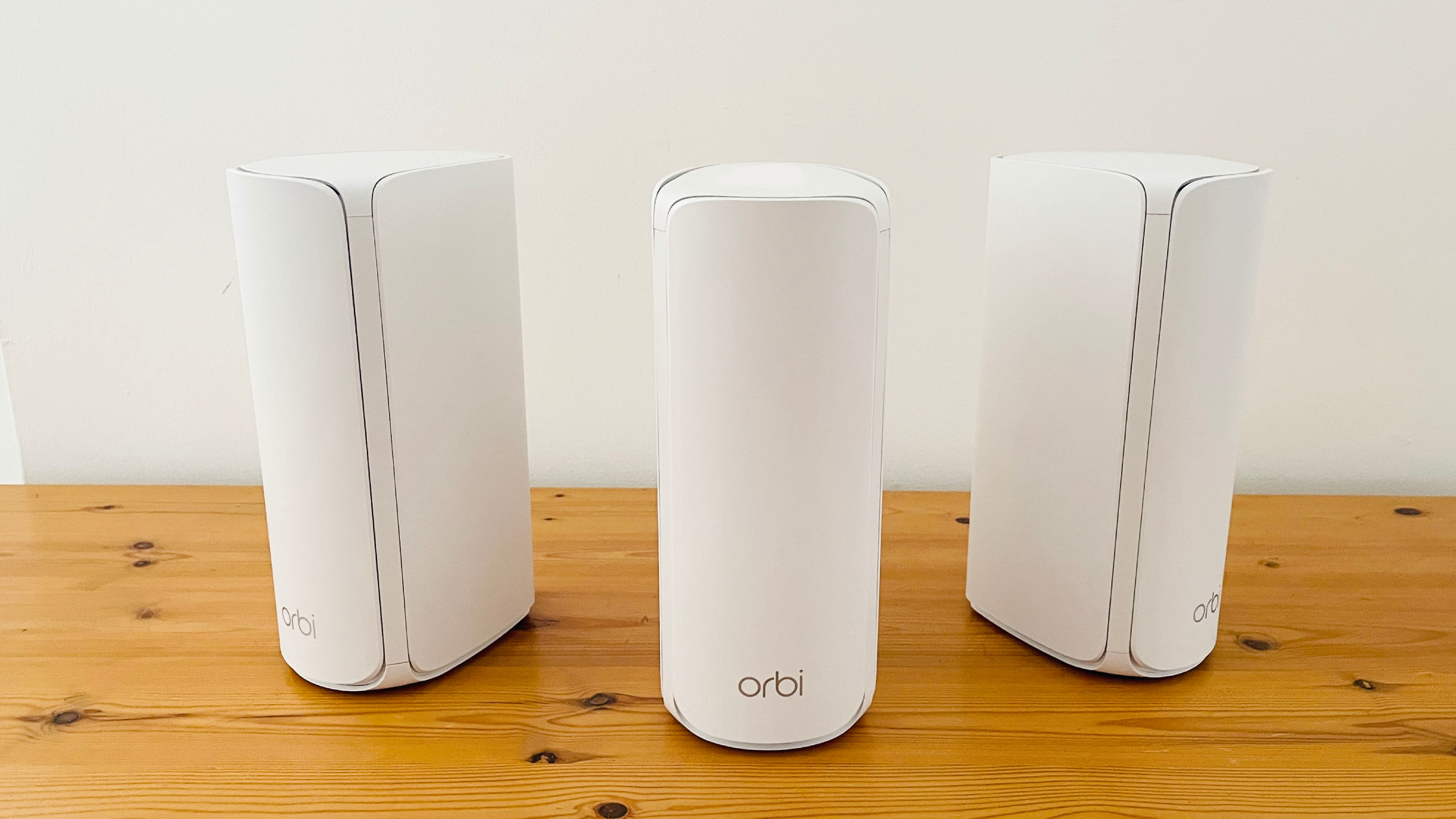
Specifications
Reasons to buy
Reasons to avoid
Wi-Fi 7 can provide a significant boost to your home Wi-Fi, but most routers offering this connectivity cost a pretty penny. While we wouldn’t call the Netgear Orbi 770 “cheap,” it’s still reasonably priced considering all of the fantastic features you get (especially compared to Netgear’s other very expensive routers), and thanks to the fast speeds and huge range of this system, it's the best mesh Wi-Fi system for larger homes.
It boasts performance that should eliminate Wi-Fi dead spots in all but the most expansive of homes. Our testing saw it eat up a pesky dead spot that has tripped up other routers in the past, blasting the full 150Mbps our broadband provided to all corners of the home. And with its ability to hit speeds of almost 11Gbps, it should be more than enough for any home user (and a fair few businesses, too).
The Netgear Orbi 770 supports some useful extras, too, including the ability to set up a dedicated internet of things (IoT) network for your smart home accessories, keeping your regular network free for everything else. And it features multi-link operation too, which lets it combine the 5.0GHz and 6.0GHz bands together in order to improve performance (provided your devices support Wi-Fi 7). That all makes it a premium mesh router system that should last for years to come.
Read our full Netgear Orbi 770 review
The best value mesh Wi-Fi with easy setup
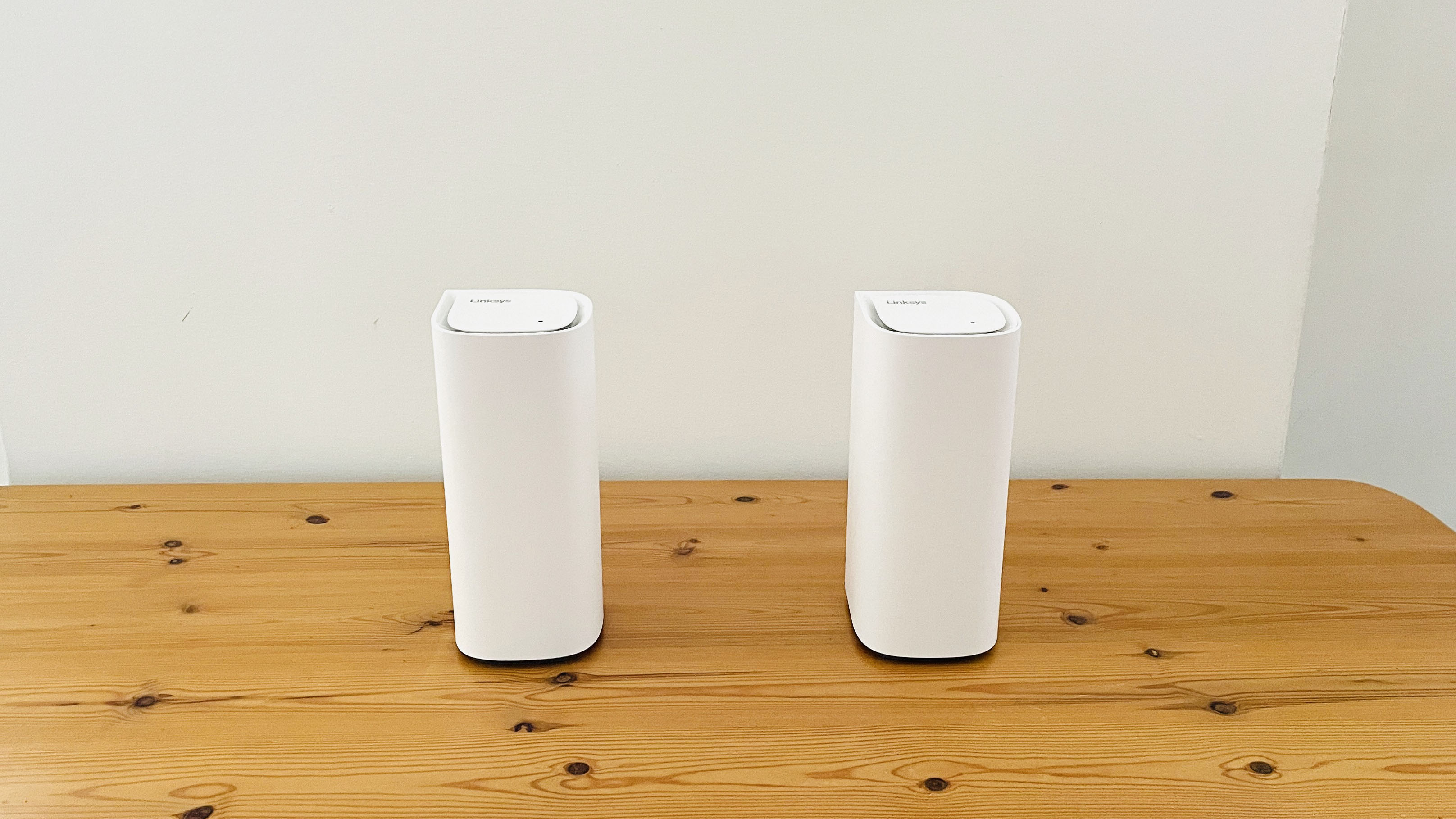
Specifications
Reasons to buy
Reasons to avoid
If you want excellent Wi-Fi 7 coverage without having to pay a fortune, then the Linksys Velop Pro 7 is the best mesh Wi-Fi system for you.
It combines super-fast tri-band Wi-Fi 7 with an easy-to-use setup, solid design and a price that undercuts a lot of the competition. We tested the two-unit set, which offers a great balanace of affordability and range, though if you have a very large property, the three-unit pack might be better suited to your needs.
As a tri-band Wi-Fi 7 router, the Linksys Velop Pro 7 uses the 2.4GHz, 5.0GHz and 6.0GHz frequency bands, which will be more than fast enough to cope with most home and office broadband connections.
You can set up a guest network and implement parental controls all via the app. During our review we found the Linksys Velop Pro 7 to be an excellent upgrade that spread fast and reliable Wi-Fi throughout the building. However, the app was a bit flaky. Not the end of the world, but we hope Linksys continues to improve the app experience.
Read our full Linksys Velop Pro 7 review
The best mesh Wi-Fi for ease of use
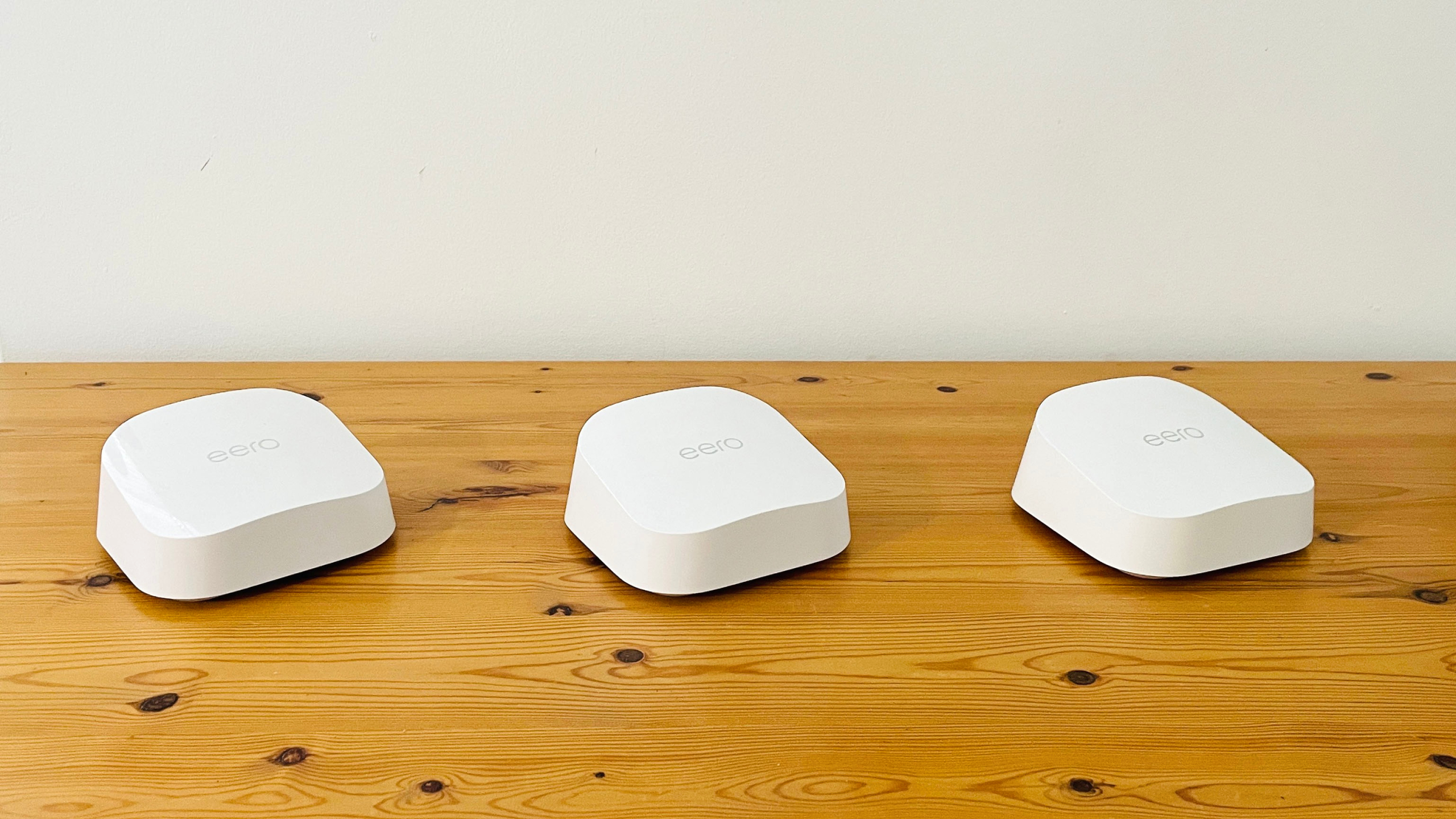
Specifications
Reasons to buy
Reasons to avoid
Setting up a mesh Wi-Fi system in your home might sound intimidating, especially if you also need to set up and position extra satellite units, but it doesn't have to be that way. If you want the best Wi-Fi mesh system that's incredibly easy to set up and use, then Amazon's latest Eero 7 system is the one to get.
This is the more affordable sibling of the Eero Max 7 and Eero Pro 7, and drops the 6.0GHz frequency band to keep prices down. So, this isn't the fastest mesh Wi-Fi system on this page (or even in Amazon's Eero range), but it's cheaper than a lot of the competition, and still offers rock-solid Wi-Fi 7 throughout small and medium-sized homes.
In our tests we found the Eero 7 performed really well, able to bring the full speed of our broadband connection to various devices at once, and even when moving into a different room, that connection remained fast and stable. However, what most impressed us in the review of the Eero 7 was how easy it was to set up and use. The well-designed Eero mobile app makes the initial process incredibly easy, and it can give you tips on where to place additional units to maximize the network coverage. The bands are all combined into a single network to make things as easy as possible.
However, some features, including parental controls, malware protection and VPN need an Eero+ subscription, which costs £9.99/$9.99 per month.
Read our full Eero 7 review
The best Powerline mesh Wi-Fi system
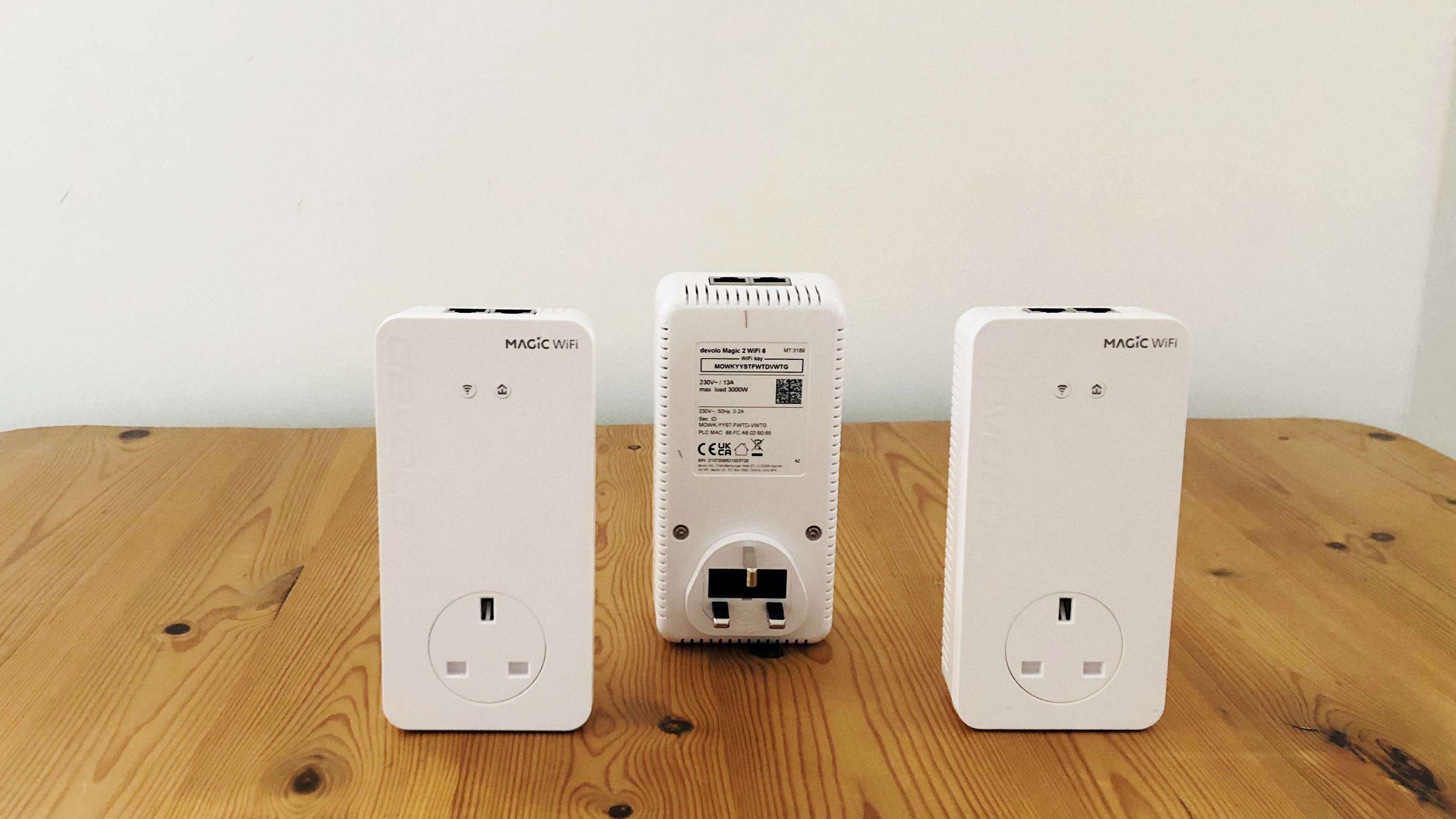
Specifications
Reasons to buy
Reasons to avoid
The Magic 2 WiFi 6 Mesh absolutely smashes through thick walls and massive obstructions by using Powerline technology to break through those obstacles. This mesh Powerline system allows you to enjoy robust and uninterrupted connectivity throughout your space even when you're dealing with an older space that regular mesh Wi-Fi routers cannot handle.
Of course, if you’ve got a large house or building with a number of rooms to cover, that mesh technology via plug-in adapters also ensures that there aren’t any dead zones or weak areas.
Performance-wise, it slays as well. It had no trouble cruising along at 110Mbps and delivering a rock-steady 12.5MB/s for Steam downloads. Its Wi-Fi speeds are relatively modest, but it’s more than enough for what most general users and households need. And, if you require an even more solid and faster connection, two Ethernet ports per device are on hand.
Read our full Devolo Magic 2 Wi-Fi 6 Mesh review
How to choose the best mesh Wi-Fi system for you
When choosing the best mesh Wi-Fi system for you, there are a few important considerations starting with the size of your coverage area and the speed you require depending on your daily average needs and the amount of devices that regularly use your network. Based on that, you need to take a look at the mesh Wi-Fi system's range and performance.
Also take a look at the design, setup process, and ease-of-use for when you need to adjust settings during use. Other features like security protocols and parental controls are important as well, and gaming-focused extra if there are gamers in the family.
Of course, the price is a major factor. Remember that many of the best mesh Wi-Fi routers tend to be expensive. However, you will find more affordable options if you know where to look.
Frequently asked questions
What does mesh Wi-Fi do?
In simple terms, a mesh setup combines a main Wi-Fi router with several additional satellites. These act as separate hubs that beam Wi-Fi signal around your home. This means that instead of relying on a single router that must reach every corner of your house, you have a team of routers, each responsible for a different area.
As you move around your home, your connected devices will automatically connect to whichever mesh satellite is providing the strongest signal. In many cases, these satellites all appear as a single network, making it simple to connect to the mesh system without having to manually select the strongest signal. It also means that you don’t have a host of devices clogging up a single router, and this can help to improve your connection strength and speed.
Generally speaking, mesh Wi-Fi systems are overkill for small homes and apartments, where a regular router should be enough to cover every corner. But if you have a large home or business – or frequently suffer from Wi-Fi dead spots that lack proper internet signal – one of the best mesh Wi-Fi systems can be an excellent solution.
What is the best mesh Wi-Fi brand?
The best mesh Wi-Fi systems include several different brands, each with its own particular strengths, and the best brand for you will depend on your specific needs. For instance, Google and Netgear provide rock-solid connectivity and are ideal for whole-home coverage or for small business use.
If gaming is your jam, brands such as Asus deliver the best mesh Wi-Fi systems, as they are specifically designed with online gaming in mind. For beefed-up security, brands like TP-Link, Netgear, and Asus all offer robust solutions to safeguard you and your data.
Is mesh Wi-Fi better than a traditional router?
The short answer is yes if you happen to live in a larger home, as a mesh Wi-Fi system is better at covering a large area than a traditional router.
If your home has large square footage or is built on several stories, a mesh system can help keep coverage constant and reliable across the whole space.
However, gaming-heavy households may prefer to install one of the best gaming routers instead, as these supply speeds that most mesh Wi-Fi systems aren’t capable of delivering. And if you're in a smaller apartment or office, then a regular router should be more than enough coverage, and a mesh Wi-Fi system will not give you much benefit, if any, for the extra expense.
How we test mesh Wi-Fi systems
We test every mesh Wi-Fi router that lands on our desk before we can recommend it to you. Much like with any peripheral or device we test, we check everything from its design and features to its performance.
We take a look at its design, of course, because if you’re going to have several routers spread around your space, they should blend in with your home or office aesthetics. We also check its ports and any extra features it might have – like the ability to create a guest network and set up family controls – as well as ease of initial setup and use.
Then we move on to its performance. We check its range and strength of coverage as well as perform the Ookla speed test and our file download test, jotting down any information we collect. Naturally, we also test it against our everyday network usage to give you a glimpse on its real-world performance.
We then take everything we’ve learned and measure all that against its price tag to see if it’s a great value to consumers.
Sign up for breaking news, reviews, opinion, top tech deals, and more.

Matt is TechRadar's Managing Editor for Core Tech, looking after computing and mobile technology. Having written for a number of publications such as PC Plus, PC Format, T3 and Linux Format, there's no aspect of technology that Matt isn't passionate about, especially computing and PC gaming. He’s personally reviewed and used most of the laptops in our best laptops guide - and since joining TechRadar in 2014, he's reviewed over 250 laptops and computing accessories personally.
- Alex BlakeFreelance Contributor
- Rob WebbContributing Writer
- John LoefflerComponents Editor